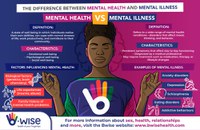
Mental Health Stigma Ends With Us

This Mental Health Awareness Month, we spoke to some of our Social Mobilisers about what mental health looks like in their communities and in their own lives. Their stories remind us that while the struggles are real, so too are the possibilities for healing, resilience, and connection.
Overcoming Stigma & Tough Experiences
By Nokulunga Ntimane
“As a young person, I battled the trauma of losing my father at the age of 8. Because, as the Nguni nation, we have little knowledge about mental care and psychologists, I never received proper care. Growing up, I struggled with low self-esteem and lived a bottled-up life.
Over time, moving into new environments and connecting with young minds helped me heal. I’ve learned to step out of my little box and embrace spaces that make me feel seen and supported.”
Nokulunga’s story reflects the lived reality of many young people: trauma left unattended, compounded by limited access to professional care. Yet, her journey also highlights the transformative power of new environments and peer connection in breaking cycles of isolation.
What Mental Health Looks Like in Our Communities
By Mildred Shabangu
“We start by finding out who people listen to. It might not be you – it could be an elder, a friend, or a relative whose voice carries weight. We try to leverage that relationship with compassion.
Then, we identify what they are struggling with. Sometimes it’s stigma, sometimes financial access, sometimes a lack of knowledge. Once we know, we support them in ways that meet those struggles.
Activities also help from meditation to hobbies like writing poems, reading, or painting. Small practices go a long way in healing.”
This reflection remind us that support doesn’t always have to be complicated. It can begin with listening, compassion, and community-based activities that nurture the mind and spirit.
Moving Forward Together
Breaking the stigma around mental health is not just about raising awareness it’s about creating spaces where people feel safe to share, to heal, and to grow. It’s about replacing judgment with compassion, silence with dialogue, and isolation with connection.
Mental health is everyone’s business. When we listen to each other’s stories and commit to building supportive communities, we take a powerful step toward wellness for all.
What does mental health look like in your community? Share your story with us and join the movement to end the stigma.
